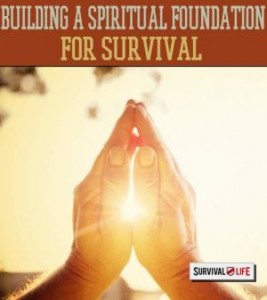 So you’ve heard the wake-up call and decided that it’s time to put together a family survival plan. Where do you start? Well, it’s like any good effort. You start with the intangible aspects first. You might think of this as being the “spiritual” side of preparedness.
So you’ve heard the wake-up call and decided that it’s time to put together a family survival plan. Where do you start? Well, it’s like any good effort. You start with the intangible aspects first. You might think of this as being the “spiritual” side of preparedness.
What does that mean? Well, before anything is created in the physical, we know that it is first created in the mind (though some call it the heart)—that is the spiritual aspect of humankind.
Consider how a high-rise building, a bridge, or a house is built. Before the finished product comes into being, architects and designers are involved in envisioning, studying, measuring, drawing, and planning.
In a like manner, for your family survival plan to be solid, sturdy, and lasting, you may wish to approach it at first as an architect would. You don’t want to jump into “piling up bricks and mortar, lumber, metal, and glass”—and then discover your building is built on sand!
Consider how the Survival Preparedness Rules of Three apply:
(From the book “Doctor Prepper’s Making the Best of Basics: Family Preparedness Handbook”, chapter 4, “The Path to Family Preparedness”)
Building a Spiritual Foundation
First, let’s look at the spiritual qualities that are the foundation for building your personal or family survival plan:
- a deep and abiding love for your family
- a strong desire to protect them
- acceptance that yours is a sacred duty to responsibly prepare your family physically, mentally, and practically for an uncertain future
- courage to make the tough decisions—the first one being to commit to protecting your family
- ability to act on your decisions and keep taking the next step(s)
- gratitude for your opportunity to do something now before you need it
- fortitude to keep going when the going gets tough
- faith in your abilities
- trust in your Maker—to guide you in what to do, where to go, and how to proceed—and humility to ask for help
- willingness to sacrifice the less important expenditures of time, money, and focus on those things that will provide the long term feeling of the peace of preparedness
- readiness to do whatever it takes
- charity to act not only in the best interest of your own family, but to share the knowledge and skills you acquire with your extended family, neighbors, and coworkers.
- And finally…hope for a bright future
Evaluate yourself in relation to these qualities stated above. Are you ready to move forward?
Know that one of the advantages of choosing a preparedness lifestyle is that you continue to mature in these spiritual qualities as you step forth in faith.
Developing Commitment to Preparedness
One of the great benefits of preparedness is ongoing personal growth. Each time you learn a new survival skill, you grow in your confidence to be able to handle the emergencies that life throws your way.
You’re reading this blog because you are, at the very least, concerned about protecting your family. The real question is: are you committed to protecting your family?
Many people make the choice to become prepared. But there is a big difference between making a choice and making a commitment!
Don’t confuse decision with action!
This story illustrates the magnitude of difference between choosing a plan and committing to a plan:
Three frogs are sitting on a lily pad in a small pond. One hungry frog ponders for a moment after looking at some ants on the shore. He then tells his two frog friends he’s going to jump from the lily pad and onto the bank of the pond to get some ants for lunch.
How many frogs are then left on the lily pad?
Everyone assumes the answer to be two frogs––but the fact is that only a decision was made––and all three frogs are still sitting on the pad.
The lesson? A decision is not an actual commitment! A choice is a first step to commitment––but it is not the commitment!
Do not procrastinate the time of implementing your family’s preparedness plan. You can make preparedness become a reality only when you act on your decision and put your plan into action!
Source:Survivallife.com
Leave a Reply